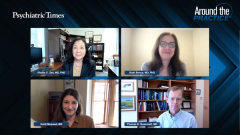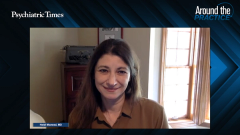
Non-Pharmacological Approaches and Counseling
A multidisciplinary panel of sleep experts reviews the role of light exposure, exercise, and other non-pharmacological methods in narcolepsy management.
Episodes in this series

Thomas E. Scammell, MD: Let's change gears a little bit and talk about treatment approaches for narcolepsy. In your own experience, is this the case that we just saw typical, Dr. Zee, before patients get diagnosed? Do you see them coming up with self-medication, like caffeine or something like that?
Dr. Phyllis C. Zee, MD, PhD: Almost always it's caffeine, and it stops working or they stop, they have side effects or rebound OTC medications. A lot of these ephedrine or pseudoephedrine types of things also tend to use a lot of that. I think that is very typical and very common before that. Nicotine is something else. People are smoking, and they are not even realizing that perhaps that is what is helping them; also, the weight issue, because sometimes they stop smoking, they also have more appetite. It's common.
Thomas E. Scammell, MD: I've seen some data, I think in Europe, that smoking is actually very common amongst narcolepsy patients. Do you have that impression amongst your population as well?
Phyllis C. Zee, MD, PhD: Not as much. It's interesting; I saw that data but, I do not see in my practice that smoking is that common. But I do know of individuals who smoke, and if they do, it's not one cigarette, but like our patient here, it is many cigarettes, perhaps two or three in a row. And I think when they're doing that, it probably is for self-medication for alertness or sleepiness.
Thomas E. Scammell, MD: Let's talk about the non-pharmacologic approaches. We have already touched on this, but Dr. Zee, since you have the floor at the moment, how do you counsel patients, on what they're eating, when they eat, drinking alcohol, getting exercise, etc.
Phyllis C. Zee, MD: I think everyone should do this as a basic approach. I want to start looking at the regularity of their sleep and wake schedule. I want to regulate that. I give them some leeway (about an hour or so of difference on school days or weekdays), and then a little bit more on weekends. I do a food diary, as part of our sleep diary, because it gives me some idea of when they are eating and how that relates to their symptoms of sleepiness. Sometimes a large meal, for example, in the middle of the day may be relevant, or knowing if they have smaller meals can be helpful. With this, I am just trying to figure out ways that I can maximize from a behavior standpoint. I don't know many narcoleptic patients that drink much alcohol, which is interesting. In fact, it's almost hardly ever, except for social reasons. I track exercise, and I also add something like exposure to bright light in the morning and during the day because it can have a mild direct effect on improving a function and perhaps alertness. I want to mention that there are now studies and trials with CBT, cognitive behavior therapy, for narcolepsy and hypersomnia that are under development. I think that would be interesting to be able to have that as another tool for our patients.
Thomas E. Scammell, MD: When you are talking about light, you are not talking about it simply as phototherapy and treatment in the morning but using it for its arousing effect through the day.
Phyllis C. Zee, MD, PhD: Through the day, and it is not to shift the clock and they do not have a circadian rhythm sleep week disorder, but using light to really enhance in the morning, get up, blinds up, get as much as light as you can in that morning time. Even in the afternoon, when they feel like they are sleepy, go out and take a walk. Walking around and exercise can be activating, as well. Both of those can be used; they don't last long, but at least intermittently could be helpful.
Thomas E. Scammell, MD: It's also doubly beneficial in the sense that people with narcolepsy have a propensity to put on weight. And so, encouraging physical activity is key. Anybody else? I hear this anecdotally, I don't know if there has been any proper research on it, but I get the impression that patients with narcolepsy are more sensitive to carbohydrate loads. If they have a big lunch, they crash afterward. Do you guys have that sense as well?
Ruth Benca, MD, PhD: Sometimes snacking through the day, particularly when you need to be awake and alert, eating smaller meals and not so many carbohydrates is helpful. I also find that getting up and moving around, not sitting at a desk a long time. Some patients report having a standing desk because if you are engaging your anti-gravity muscles or moving around a little bit, you're less likely to fall asleep, as long as you don't have cataplexy.
Thomas E. Scammell, MD: I think the points that you guys brought up in the last couple minutes are important, and we're going to come to this about the various medications from narcolepsy, but speaking for myself, I don't spend enough time doing this education about the non-pharmacologic approaches. There is an awful lot to be gained with that as far as, not only just having a healthier life in general, but doing things that are practical impact to improve alertness.
Phyllis C. Zee, MD, PhD: Schedule napping. that is something can be quite useful, short naps strategically placed according to their performance, what they need to be doing during the day, can be quite helpful as well.
Thomas E. Scammell, MD: And it's a way of minimizing medications too. Instead of giving somebody an afternoon dose of some weight-promoting agent, maybe a nap is all they need.
Ruth Benca, MD, PhD: One other thing I want to add is counseling patients about reasonable lifestyle goals or professional goals. Over the years I have had a number of physicians or students who will potentially go into careers that are going to exacerbate their narcolepsy. Something where you're going to have to be doing a lot of rotating shift work or have prolonged shifts where you're going to get sleep deprived. Those are probably not ideal career paths for people with narcolepsy. Helping them adjust to what is essentially a disability so that they can have the most normal function possible and be able to be successful.
Thomas E. Scammell, MD: Dr. Moawad, do you talk to people about vocational things if you're talking to a high school student?
Heidi Moawad, MD: It's funny that you brought that up because I did have one who went through a lot of trial and error in her life and then became an athletic trainer. And this was something that encouraged her to be physically active, but also there was a bit of flexibility in her job. She felt that that was a healthy option for her. Not only because of the lack of shift demands but also because it did encourage her in her job to be doing exercises, which she felt made her more alert. I think that this is something that can really be beneficial for people.
Thomas E. Scammell, MD: That's great. I have to say, I think some of my most vocationally successful narcolepsy patients are elementary school teachers where they have an extremely stimulating environment, but sometimes they say when the kids go home at 3:00 they put their head down on their desk and take a nap. I think I would add jobs that require sustained attention like air traffic controller, which is probably not going to be a good match if you're just sitting there staring at a screen.
Ruth Benca, MD, PhD: In the dark.
Thomas E. Scammell, MD: What do you all think about jobs such as commercial driving for narcolepsy patients?
Ruth Benca, MD, PhD: Not a good option.
Thomas E. Scammell, MD: Would you say, is it absolutely forbidden? Would you say this really applies to all patients?
Ruth Benca, MD, PhD: I think it depends on a combination of how severe the narcolepsy is. Because we see quite a range. There are people with milder disease, and it also depends on what kind of driving we're talking about; cross country driving 10 hours a day, probably not; doing city driving where you're never driving more than 10 or 15 minutes at a time, that might be okay.
Phyllis C. Zee, MD, PhD: I agree. It needs to be individualized, but certainly, if you're in commercial driving or you're a truck driver going long distances we already know that they're at risk for obesity for many of the other comorbidities. That would just be increasing, I think, their vulnerability to developing other sleep disorders or other medical conditions already comorbid with narcolepsy.
Thomas E. Scammell, MD: I'm reminded of a patient of mine who got fired from his job because he was just too drowsy at work and to make money, he started doing Uber driving. I thought, oh no, it's going from bad to worse. Fortunately, he got a more appropriate job soon after.
Transcript edited for clarity
Newsletter
Receive trusted psychiatric news, expert analysis, and clinical insights — subscribe today to support your practice and your patients.












